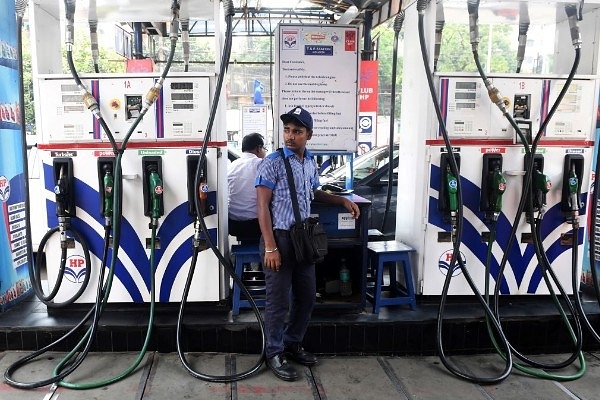Politics
Explained: Controversy Around Government Oil Companies Seeking Data Of Petrol Pump Employees
- The Ministry of Petroleum and Natural Gas has asked for personal details of 10 lakh petrol pump employees. This has stirred a controversy.

An Indian petrol pump attendant waits for customers at a gas station in Kolkata. (DIBYANGSHU SARKAR/AFP/Getty Images)
A storm has broken out over the Ministry of Petroleum and Natural Gas seeking personal information of 10 lakh petrol pump employees. It all began with letters written by the three public-sector oil companies – Indian Oil Corporation (IOC), Bharat Petroleum Corporation (BPCL), and Hindustan Petroleum Corporation (HPCL) – to their dealers across the country, seeking employee data under various heads for the Recognition of Prior Learning (RPL) scheme under the Prime Minister’s skill development programme.
Before delving further into the contours of the controversy, it would be apposite to note what exactly the RPL scheme is and the guidelines released by the government with regard to the same.
The Ministry of Skill Development and Entrepreneurship (MSDE) launched the Pradhan Mantri Kaushal Vikas Yojana (PMKVY) with a view to imparting industry-level skill training to the Indian youth. The RPL constitutes a part of the PMKVY, and its goal is to assess, certify, and help individuals with skills or prior experience. The objectives of the RPL, as per the PMKVY guidelines (2016-2020), are threefold, namely:
- Bring about an alignment in the competencies of those engaged in the unregulated workforce with the standardised National Skills Qualification Framework (NSQF)
- Provide individuals with career/employability options, or, alternately, enable them to pursue higher education
- Reduce inequalities by preferring skill development in specific areas over others
Furthermore, the RPL envisages three project types, that is, RPL camps, employer’s premises, and RPL centres for the purposes of assessing the skills already possessed by the individuals concerned. Among the conditions specified for beneficiaries under the RPL are that individuals possess an Aadhaar card and a bank account with an exception provided for the residents of Jammu and Kashmir and certain northeastern states, whereby residents of these states could furnish alternate identification proof like the permanent account number (PAN) or the voter ID, as applicable. The PMKVY guidelines also provide for a pre-screening process, wherein part one specifies the collection of supporting documents and evidence from candidates. The documents and evidence to be collected have been prescribed by the Skills Development Management System (SDMS), which is a tool through which the assessment and certification of candidates is done.
Now, coming to the issue at hand, the letter written by the three public oil companies has caused a furore, because an association of petroleum dealers, the Consortium of Indian Petroleum Dealers (CIPD), has claimed that this programme of the major oil companies is violating of fundamental rights. Questions have been raised over the necessity for petrol pump employees to furnish their Aadhaar number, the Aadhaar-seeded bank, religion, and caste for the purposes of this RPL programme.
It has been reported that in spite of the reservations expressed by the dealers, the government has refused to back down and has reportedly signalled their intention to stop supplies to non-conforming dealers. With elections around the corner, questions are being raised as to whether the latest move is to mine critical data for electoral purposes or is part of a conscious effort to scale up the numbers of those skilled under the government scheme.
On the part of the major oil companies, officials are said to have confirmed that the information is being sought for the government’s RPL programme, according to this report in the Hindu Business Line. It has also been reported that the Petrol Pump Dealers Association of Punjab has issued legal notices to the senior executives of the concerned public oil companies (IOC, BPCL, and HPCL). While it is not clear how the issue is expected to pan out in the coming days, it appears that the oil majors have been following the guidelines laid down during the formulation of the RPL scheme, which requires candidates to perforce have Aadhaar numbers so as to be eligible to participate under this scheme.
The other requirements sought by the public oil companies also appear on first sight to be drawn from the fields mandated by the SDMS and, while the suitability of having such eligibility requirements could be debated and questioned, it appears that the public oil companies in the case have been following pre-set guidelines and have not arbitrarily set these requirements.
Introducing ElectionsHQ + 50 Ground Reports Project
The 2024 elections might seem easy to guess, but there are some important questions that shouldn't be missed.
Do freebies still sway voters? Do people prioritise infrastructure when voting? How will Punjab vote?
The answers to these questions provide great insights into where we, as a country, are headed in the years to come.
Swarajya is starting a project with an aim to do 50 solid ground stories and a smart commentary service on WhatsApp, a one-of-a-kind. We'd love your support during this election season.
Click below to contribute.
Latest